12 Rights Organizations Urge Global Action To Stop Executions In Iran
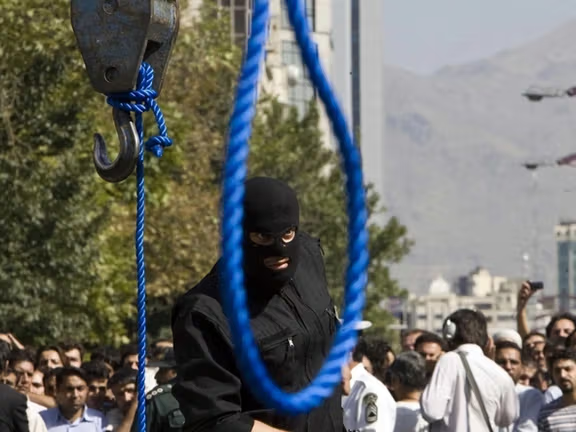
Twelve human rights organizations described the latest wave of executions in Iran as "alarming", calling for an immediate global response.

Twelve human rights organizations described the latest wave of executions in Iran as "alarming", calling for an immediate global response.
In a joint statement on Tuesday, they said:“These executions are deliberately designed to spread fear among the Iranian population and quash any form of dissent following the unprecedented nationwide protest movement that began eight months ago.
“Unless the international community takes robust action now, these executions will continue.”
The Abdorrahman Boroumand Center, Article 19, the Baloch Activists Campaign, Impact Iran, and Iran Human Rights are among the signatories against the chilling surge in executions by the Islamic Republic of Iran over the past few months, including the recent wave of executions targeting protesters.
As part of their calls for accountability, the rights organizations urged for targeted measures and restrictions against individuals and entities involved in these arbitrary deprivations of life.
“The recent executions in Iran demand an urgent and united response from the international community. We cannot stand idly by while scores of people are being executed, death row inmates and their families (who may themselves be persecuted for advocating on behalf of their loved ones) are waiting in terror, human rights are trampled upon, and justice is denied. The time for action is now,” read the statement.
At least 142 people were executed in Iran's prisons last month. This is the highest monthly figure since 2015.
Also, the number of executions in the first five months of 2023 has increased by 76% compared to the same period last year.
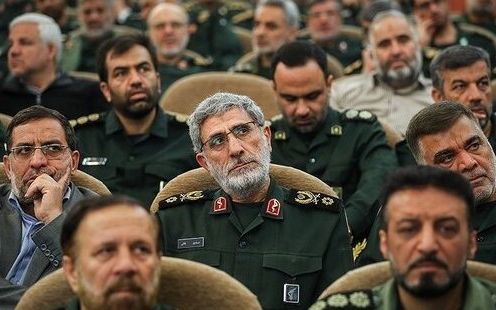
Israeli media reported that a new unit of the Iranian Islamic Revolutionary Guard Corps smuggles supplies and logistics for the Quds Force.
The unit is headed by a former Quds Force official with extensive connections in Iran, Syria, and Lebanon, identified as Gal Frasat, the Israeli weblog Intellitimes reported. According to Iran International's investigations the correct name of the agent is Ali naqi Golparast.
Among its duties will be transferring military equipment to pro-Iranian militias, particularly in Syria and Lebanon, the report adds.
The Qods Force manages most of Iran’s military, intelligence and even political affairs in Iraq, Syria, Lebanon and Yemen.
There have been several headlines regarding Iranian arms sales in recent years, particularly regarding smuggling weapons to terrorist militias in Gaza, Lebanon, and Syria, as well as supplying Russia with weapons during their war on Ukraine.
Last week, Ukraine approved sanctions against the Islamic Republic for a period of 50 years for its supplying weapons to Russia which have wrought havoc to cities in Ukraine. A massive 328 lawmakers voted in favor of the bill.
Among the sanctions were a ban on trade, the transit of Iranian resources, flights, and transportation within Ukraine, according to Ukrainian media.
SkyNews reported this week that Iran had been selling ammunition to Russia for its invasion of Ukraine. It was the first official confirmation of what Kyiv and Washington had long suspected.

Iran’s former foreign minister Mohammad Javad Zarif in unprecedented revelations said that Donald Trump had invited him to the White House, but he was “not allowed” to go.
Zarif was guest in a five-hour discussion session in Persian on the social media audio app, Club House, and around 40,000 people listened in.
The former foreign minister has long been a favorite target of Iran’s hardliners as the supposed architect of the 2015 JCPOA nuclear deal and allegedly as a man pre-disposed to forge better ties with the United States and Europe. But in recent days these attacks intensified as Zarif began to tweet after a long silence.
Zarif without mentioning a name said, “A senator close to Trump came to see me in New York and said Trump had invited me to the White House. I relayed this message to Tehran and said if I fail [in resolving differences] I will accept punishment, but the message did not reach higher echelons and was rejected at lower levels.”
Although Zarif did not mention when this incident took place, media reports during his visits to New York show that it was most likely in the first half of 2019,or a year after Trump withdrew from the JCPOA.
However, his claim that his message was not relayed to top decision makers leaves question marks. The nuclear dispute with the United States, crippling sanctions the Trump administration imposed and the danger of a military confrontation at the time, made a meeting with Trump a crucial development for Tehran and such a message would have certainly been delivered to Supreme Leader Ali Khamenei, the ultimate decision maker.

Zarif’s claim that lower-level people prevented him from meeting Trump, might be a tactic to protect Khamenei, whom many Iranians blame for the costly confrontation with the United States.
In fact, Zarif himself admitted during the discussion that “all reports were being relayed to Khamenei, and he expressed his opinion whenever he wanted…”
Zarif also spoke at length about his diplomatic efforts, trying to enlist the help of French President Emmanuel Macron and Russian President Vladimir Putin to make an opening with the Trump administration.
Zarif claimed that Macron told him in Paris that Trump was ready to meet with him, but “I did not have permission to meet with Trump.”
“In contrast to Trump, former Secretary of State Mike Pompeo was a person, who driven by his ideology spoiled everything related to the JCPOA. The triangle of Benjamin Netanyahu, Mike Pompeo and [former national security adviser] John Bolton” did everything to prevent a meeting with Trump.
This statement somewhat contradicted Zarif’s earlier assertion that he was not allowed by Tehran to meet with Trump.
“I asked Vladimir Putin to directly relay Iran’s plan for the JCPOA to Trump, without [Secretary of State] Pompeo’s intervention, but Pompeo realized this and prevented it.”
Zarif speaking about Iran’s inability to pressure the US said, “Iran can pressure Europe but due to American economic clout the Europeans acted in a weak manner regarding Iran, but they helped the Islamic Republic to obtain management posts in the United Nations.”
The former foreign minister was referring to European banks and companies generally abiding by US sanctions and adding to the economic pressure on the Islamic Republic. However, he did not mention any details about the posts he claimed Europeans helped secure at the UN.
Regarding the JCPOA negotiations from 2013-2015, Zarif said, “We wanted to break the security consensus formed against Iran and for this reason we negotiated. Removing [international] sanctions was not our only goal.”
Zarif’s appearance and statements in the Club House discussion are bound to reverberate in Iran and lead to strong attacks by hardliners. It is not clear why he chose to speak now and to what extent this is a part of an orchestrated effort by top decision makers, who are facing similar international isolation and security threats as a decade ago.
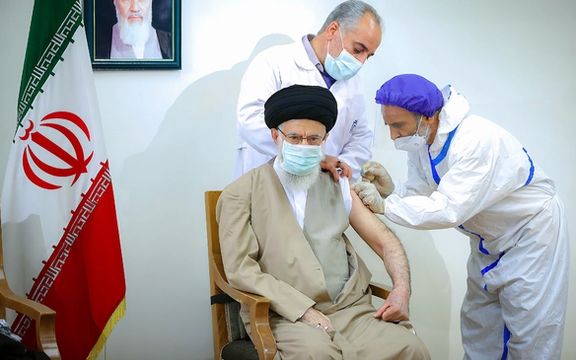
A team of medical experts in a damning report claim that over 75,000 Covid deaths could have been prevented in Iran if the regime had permitted global vaccines.
Supreme Leader Ali Khamenei ruled out importing United States and British made Covid vaccines in January 2021, arguing that Western countries could not be trusted and Iran was well placed to develop its own vaccines or should take them from more reliable sources.
At the time, the US-German Pfizer, US-made Moderna and the British-made AstraZeneca were the only vaccines approved internationally.
But in a new paper published in association with the British Medical Journal and Yale called, ‘A quantitative evaluation of the impact of vaccine roll-out rate and coverage on reducing deaths from COVID-19: a counterfactual study on the impact of the delayed vaccination programme in Iran,’ a team of experts have found evidence to show mass neglect on the part of the regime.
The paper, compiled by experts of Iranian descent, Mahan Ghafari, Sepanta Hosseinpour, Mohammad Saeid Rezaee-Zavareh, Stefan Dascalu, Somayeh Rostamian, Kiarash Aramesh, Kaveh Madani and Shahram Kordasti, compared Iran with eight model countries with similar income brackets and dominant COVID-19 vaccine types.
The analysis revealed that faster roll-outs were associated with higher numbers of averted deaths. "While Iran's percentage of fully vaccinated individuals would have been similar to Bangladesh, Nepal, Sri Lanka, and Turkey under counterfactual roll-out rates, adopting Turkey's rates could have averted up to 50,000 more deaths, whereas following Bangladesh's rates could have led to up to 52,800 additional loss of lives in Iran,” said the paper.
“Also, following Bahrain's model as an upper bound benchmark, Iran could have averted 75,300 deaths throughout the pandemic, primarily in the under 50 age groups.”
Just last year, it was announced in a shock move that Iran's Judiciary had accepted a lawsuit against the Supreme Leader and others for delay in mass vaccination and thousands of preventable deaths.
The 22-page litigation called for the prosecution of Khamenei and other officials, including former president Hassan Rouhani and member of the National Coronavirus Combat Taskforce, for "manslaughter of over 100,000 Iranians." Lawyers who filed the case, Mohammad-Reza Faghihi and Arash Kaykhosravi, were among six people arrested in August 2021 apparently after meeting to discuss their legal action over Covid, but later freed.
While Khamenei banned the Western vaccines, hundreds of millions of dollars were distributed among government-run companies with no experience in vaccine development to produce a homegrown variant.

One vaccine that was introduced into the local market in June 2021 was Barakat, developed by an affiliate of the Execution of Imam Khomeini’s Order Foundation, a charitable-cum-business entity controlled by Khamenei’s office. As a result, Iran, which was receiving very few vaccines from Russia and China until August lost precious months to vaccinate the majority of its population.
The Barakat vaccine with delays in production has only been used for inoculating a fraction of the population. Critics call these decisions and failures “Covid mismanagement”, which the lawsuit tried to pursue.
Vaccination suddenly jumped in August with Chinese and AstraZeneca vaccines, as the Khamenei ban was rescinded when Ebrahim Raisi, Khamenei’s candidate for president assumed office. Figures of total deaths are unclear due to the secretive nature of the regime, but officially stand around 150,000 according to declared numbers given to the World Health Organization.
Human Rights Watch called Khamenei’s ban “moves to politicize vaccine acquisition” but acknowledged that US ‘maximum pressure’ sanctions thwarted Iran’s access to vaccines.
This assessment is also questionable, because medicines are exempt from US sanctions and Iran regularly imports billions of dollars of drugs and raw material to produce medication from Europe, India and elsewhere.
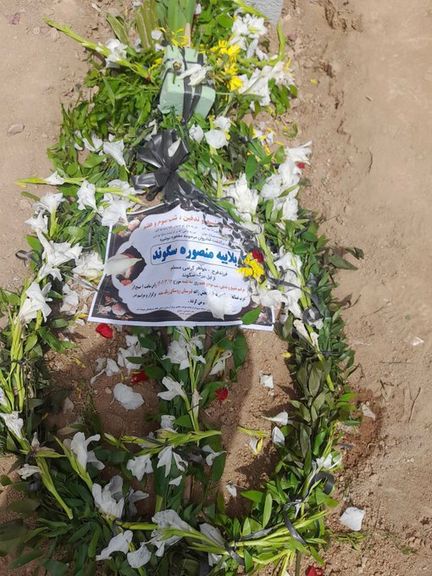
The body of Mansoureh Sagvand, the former police assistant who defected in the wake of nationwide protests, was laid to rest in her native town amid high tensions.
According to information received by Iran International, the funeral ceremony was held on Tuesday in the village of Rig Sefid near Khorramabad while regime agents closed roads leading to the village.
A large number of people showed up for her funeral service despite the heavy security presence. The mourners sang local folklore songs with themes such as ‘time to fight’ and ‘resistance’ while holding placards that called for justice over her death.
Sagvand had said in a message to her friend that she was threatened with death by the intelligence officers, emphasizing: "If something bad happens to me, I want everyone know that I did not commit suicide."
The young girl was a law student in the southern city of Abdanan and resigned from her position as a police aide amid the anti-regime protests in the past months.
Her body was found in her house in Abdanan a few days after she was released from police custody on bail on unknown charges.
Activists say evidence suggests Sagvand has been murdered by the Iranian regime as she was a staunch supporter of the exiled prince Reza Pahlavi. However, just like they did with Mahsa Amini who died in morality police custody, Iranian officials are claiming that Sagvand died of a cardiac arrest.
Exiled Iranian Prince Reza Pahlavi published a photo of Mansoureh Sagvand on Monday, calling on the people of Lorestan and neighboring provinces to participate in the funeral ceremony of “the daughter of Iran".
"Let the regime and its mercenaries know these crimes will not be forgotten, and any disturbance in the funeral ceremony and harassment of his bereaved family will only fuel the anger of the Iranian people," read his tweet.
Last week, Bamshad Soleimankhani, a 21-year-old student from Abdanan, died in hospital with symptoms of poisoning shortly after being released from prison after his arrest for participating in protests. Local media also said signs of fracture and torture were visible on the young man’s body.
Following Soleimankhani's suspicious death, the city of Abdanan became the scene of anti-government protests on Friday, in which at least 20 protesters were injured by birdshots.
This is not the first time the Islamic Republic does not assume responsibility for the ill-treatment and torture of detainees. During the nationwide protests the clerical regime claimed many protesters died after falling from a height or committing suicide.
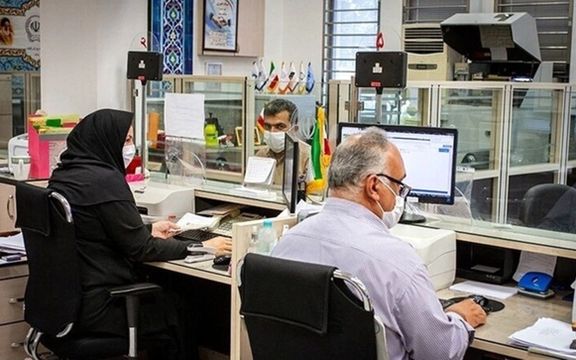
The Iranian government changed working hours at its offices and agencies on Tuesday, causing many problems for employees and citizens.
According to the decision, government working hours in the country will begin at 06:00 local time (GMT 3:30) and end at 13:00 for three months.
As there are many people commuting daily from the suburbs to mega cities like the capital Tehran, countless employees must get up at least two hours earlier which affects their sleep routine.
Those who have children say, "office hours are from 6:00" but "kindergartens open at 7:30."
With the current plan, the working hours of government agencies decreased by one hour a day with the parliament speaker Mohammad Bagher Ghalibaf opposing the decision.
The government says the change has been approved in line with "optimal management of energy consumption" with all executive bodies obliged to turn off cooling systems one hour before the end of work.
It also claims the employees would make up for the loss through remote work, but the parliament speaker rejects this solution as being “illegal”.
“The working hours of the employees are forty-four hours a week and the Council of Ministers and executive bodies only have the authority to determine the order of the announced hours,” Ghalibaf said last week.
Electricity consumption has been increasing in Iran because of very low prices, considered a subsidy in the state-controlled economy. While both power plant capacity and their fuel supply remain inadequate, Iran exports electricity to Iraq.
Last year the country faced a deficit of about 14,000 megawatts in electricity production with blackouts during the summer when consumption was at its peak.